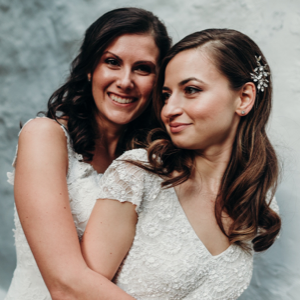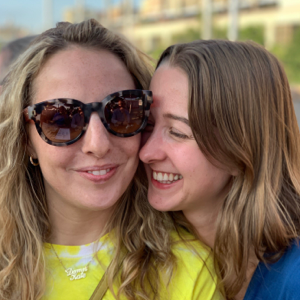Amy Lightfoot
AWIE Slack Community Member
Solutions Consultant at We Make Websites
Pronouns: she/elle (French and English!)

Can you tell us about the first time you were aware of and celebrated Pride — and what inspired you to do so?
I was very fortunate to be raised in a pro-LGBTQ+ family so attended events before I was even conscious of them. I went with friends in high school as I had a few friends who were out and it was really amazing.
Can you share more about what Pride means to you and your connection to it?
As someone who is queer, Pride is really important to me. I think people lose track of the fact that the first Pride was a riot and that is what I try and keep in mind when I’m choosing events.
Can you share about the importance of LGBTQIA+ representation in the workplace and how you use your role to build awareness and create space for the LGBTQIA+ community?
Having queer staff, especially in leadership, makes a huge difference. It’s important to feel like you are able to grow in an organization.
As an out person in my workplace I have been a safe person to speak to for other queer members of staff, particularly those who aren’t out at work. I am always talking about important LGBTQIA+ news and sharing content.
Alexandra Tanner
2020 Amazing Women in eCommerce Honoree
Vice President Digital Commerce and User Experience, Central Garden & Pet
Pronouns: she/her

Can you tell us about the first time you were aware of and celebrated Pride — and what inspired you to do so?
I remember my first New York Pride March in 2013 pretty vividly as I had driven down from my hometown of Montreal to attend. Edie Windsor was the Grand Marshall that year and seeing her in person and cheering her on was pretty profound. Edie Windsor was a LGBTQ+ trailblazer and the lead plaintiff in the Supreme Court case United States v. Windsor. The Windsor decision in 2013 overturned the Defense of Marriage Act and became the cornerstone of marriage equality in the U.S.
On a personal note, I didn’t know then how significantly the marriage equality act would affect my life, but fast forward to 2017 when I married my wife Michelle and was able to become a U.S permanent resident through marriage — something you could not do as an LGBTQ+ couple until 2014.
Can you share more about what Pride means to you and your connection to it?
Pride is about showing up as a community and creating a celebrated space to be unapologetically yourself. In a lot of ways, I think the concept of Pride is taken for granted, as something that is earned and can never be taken away, informed by the idea that we as a society keep progressing forward. The past few years have shown me that rights can be stripped away. We need to continually fight to ensure that we are achieving equality and rights for ALL members of the community and not just some.
Meghan Stabler
2020 Amazing Women in eCommerce Honoree
Senior Vice President, BigCommerce
Pronouns: she/her

Can you tell us about the first time you were aware of and celebrated Pride — and what inspired you to do so?
It was in the early 90s. I’d lost several friends to the effects of HIV/AIDS and wished to show my support for a community that was in crisis and needed help.
Can you share more about what Pride means to you and your connection to it?
It’s about showing the world that we are [still] here. We are happy, authentic, and prideful, and our many differences, even within the community, unite us as a wonderful tapestry of fabulousness. Visibility is also helping to show others, who are closeted or struggling to come out, to be authentic because there are others just like them. Essentially, PRIDE offers hope via visibility and authenticity to others.
Can you share more about the importance of LGBTQIA+ representation in the workplace and how you use your role to build awareness and create space for the LGBTQIA+ community?
Being LGBTQ+ is to be in a minority. As a leader in both my company and in the wider LGBTQ+ community, I believe that my visibility shows everyone, including our “cis” colleagues, that we are as human as them and as capable as them. We can use our positions of leadership to amplify and raise up others, we can be their voice as needed, and when we see any form of discrimination — we can stand up and address it.
Kate Bould
From the Yotpo and Amazing Women in eCommerce Teams
Brand Marketing Manager, Yotpo
Pronouns: she/her

Can you tell us about the first time you were aware of and celebrated Pride — and what inspired you to do so?
I’m from Texas, and with that, a very homogenous part of Texas, so my exposure to pride and queer communities was pretty nonexistent. It wasn’t until I was in college, studying abroad, that I realized I was queer and started to educate myself on the queer community and its history. Right after studying abroad, I went to the Pride march in New York, but in a kind of closeted way — I kept telling people I was going to visit a friend and had ‘no idea’ it was Pride weekend — but at that point, Pride for me was a lifeline. It was the first time that I felt like I could be open about who I am. I just remember being basically alone in this crowd of people, feeling so overwhelmed by their joy, resilience, and power.
Can you share more about what Pride means to you and your connection to it?
For me, Pride is about community; it’s about acknowledging and celebrating my own experiences, while also taking that time to learn about and celebrate the experiences of others. There was a time when so much of my identity was wrapped in shame and Pride is a time where I can recognize that complexity and still find joy in it. Pride started as a protest and in my opinion, will always be a protest. Black Trans women really propelled the Pride movement at the end of the 1960s and it’s 2020 and we’re still here fighting for many of those same rights.
Can you share more about the importance of LGBTQIA+ representation in the workplace and how you use your role to build awareness and create space for the LGBTQIA+ community?
It’s absolutely crucial. You can’t be a progressive or relevant company without a representative perspective and voice. At my first company, during my first week working there, our director outed me to our entire team. From that moment on, I realized how important it was to talk about my identity and build awareness of the varied experiences of the LGBTQIA+ community, so that people would be more equipped to sympathize, listen, and educate themselves, to avoid situations exactly like that. When it comes to brand communications and AWIE, it’s obviously super important to have inclusive imagery, communications, and voices represented — that said, I’m lucky to work alongside many people that feel the same way, so our responsibility is really to hold ourselves and one another accountable.
Want to be a part of the conversation? Join the AWIE Slack Community!



